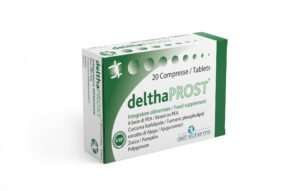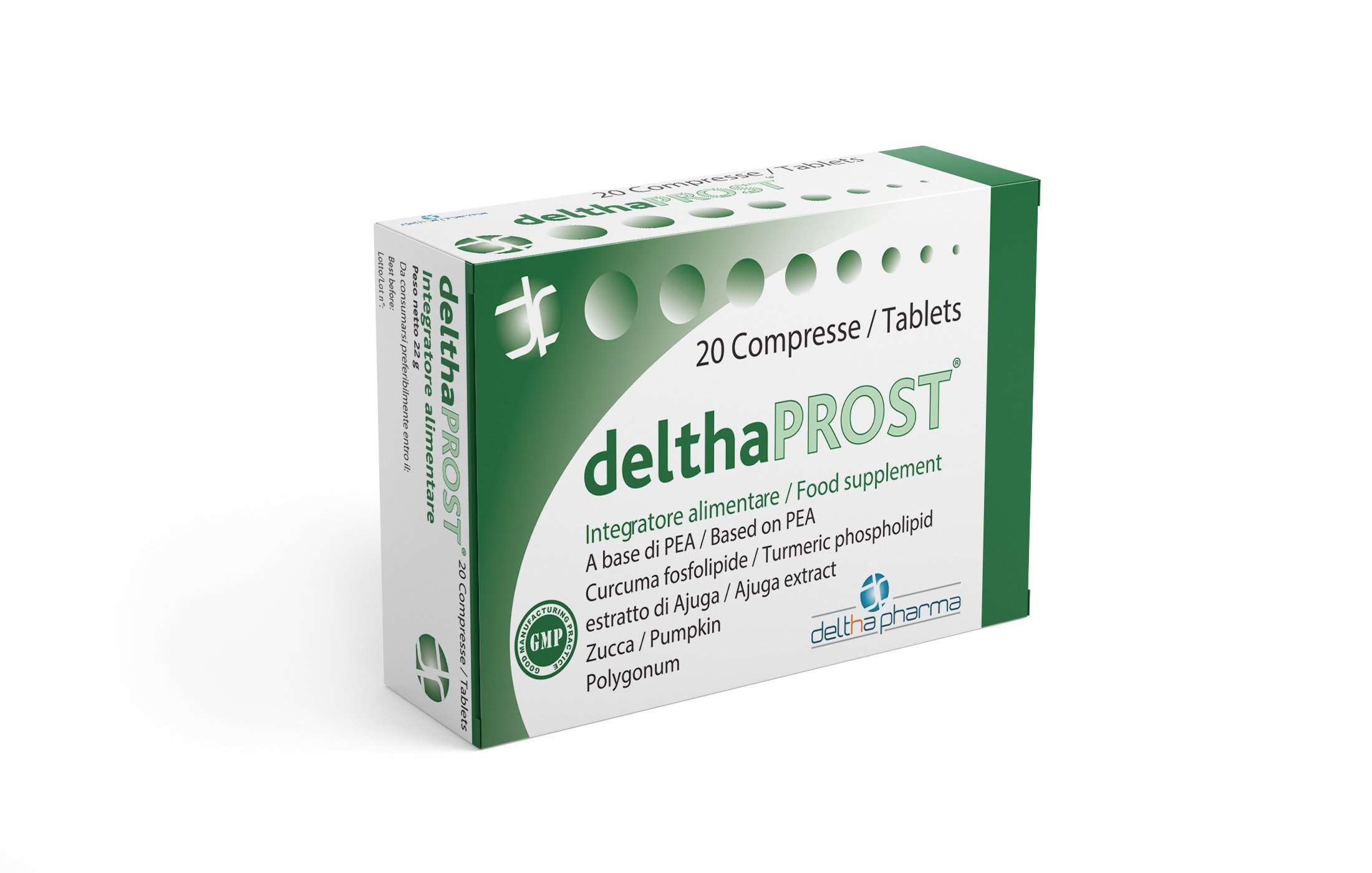Urogynecological Line: delthaPROST®
The prostate is a gland that makes part of the male genitourinary system. It is located just below the bladder and surrounds the urethra. Generally, the prostate gland tends to grow in volume as men age. The enlarged prostate is known as benign prostatic hyperplasia (BPH), or benign prostatic hypertrophy, that can result in the obstruction of the urethra and give rise to the so-called LUTS (lower urinary tract symptoms): increased frequency of daytime and nighttime urination, difficulty in emptying the bladder completely and a feeling of heaviness, difficulty in postponing urination, weak flow, etc. In addition, the prostate can go through inflammation (prostatitis) both acute and chronic which also leads to LUTS.
delthaPROST® is a dietary supplement containing Teoside, Palmitoylethanolamide (PEA), N-Acetylcysteine, Resveratrol, Phytosomal Turmeric (Meriva) and Pumpkin Seed, which is useful in restoring and maintaining the normal functions and protecting the balance of the male urinary system by taking advantage of the synergy between innovative and natural components.
Teoside is extracted from plant stem cell cultures of Ajuga reptans, a herbaceous plant already known in folk medicine to counter febrile states, hemorrhages, ulcers, skin and biliary diseases, and bacterial and fungal infections. Teoside, a secondary metabolite that the plant produces for defensive purposes, is now obtained by exploiting plant stem cell cultures, without any genetic manipulation [1]. The advantages of cell cultures lie in the production of the active ingredient in a desired and standardized quantity, independent of seasonality and high purity (absence of heavy metals, pesticides, environmental contaminants) and without affecting natural and environmental resources. Thanks to this technology, TEOSIDE has been classified and approved for food use as the first Novel Food (“new” regulated foods or ingredients according to EC Reg. 258 of 1997).
Palmitoylethanolamide (PEA), has shown a potent anti-inflammatory and analgesic effect studied in 1993 by Nobel laureate Rita Levi Montalcini. The ALIA (Autacoid Local Inflammation Antagonism) effect is referred to: PEA is able to contain the release by mast cells of cytokines such as IL1, IL6, IL10 and TNFα in tissues, which act as initiators and perpetuators of inflammation in response to noxious stimuli. Thus, the action of PEA allows a reduction in edema, pain, and the inflammatory process itself.
N-Acetylcysteine (NAC) is an N-acetylated derivative of the sulfur amino acid cysteine. The presence of sulfur confers antioxidant and mucolytic activity, which is particularly appreciable in cases of congestion. As an antioxidant, NAC is believed to enhance the glutathione (GSH) system and together stimulate T lymphocyte and macrophage activity with benefits on immunomodulation. As a mucolytic and mucus thinner, the free thiol group (SH) can cleave disulfide bridges characteristic of cyclic mucoproteins, inhibiting their aggregation and reducing mucus viscosity and facilitating drainage. In addition, NAC acts on the possible purulent component of secretions by virtue of its ability to depolymerize nucleic acids. Also important is its deconstructing and inhibiting effect on bacterial biofilms. Biofilms are protective structures that bacteria create to protect themselves from antibiotics, survive and perpetuate their presence in various districts, thus constituting a source of nuisance recurrence. Many works have studied and confirmed that NAC supplementation constitutes a nonpharmacological strategy to counter such infections. The NAC contained in Delthaprost is obtained from the yeast Saccharomyces cerevisiae by fermentation and not from animal sources.
Polygonum cuspidatum is an herbaceous perennial plant of very ancient origin having even been found fossil traces dating back to the Tertiary period. The rhizomes, or underground roots are among the richest natural sources of Resveratrol, containing 400 times more of it than grapes and derivatives. In conjunction with the other active components (emodin and polydatin) that can increase its bioavailability, the Polygonum cuspidatum phytocomplex shows marked anti-inflammatory and antioxidant properties, modulates arachidonic acid and nitric oxide metabolism, is valued for its anti-aging activities and studied for its antimutagenic, antiproliferative and antitumor potential.
Turmeric, known and used since ancient times for its extraordinary anti-inflammatory, antioxidant and pain-relieving properties, the latter due to its ability to act specifically on nociceptors. The active ingredients consist of Curcumin, Demethoxycurcumin and Bisdemethoxycurcumin, more generically referred to as curcuminoids. Recent studies also document its antitumor and cardioprotective activity (Effects of Curcuminoids on Frequency of Acute Myocardial Infarction After Coronary Artery Bypass Grafting-journal of Cardiology). However, extractive curcumin suffers from low intestinal absorption and high hepatic first-pass metabolism with destruction of the active ingredients. These critical issues are overcome by using Meriva®, which exploits the ability of phytosomes to polarly bind curcuminoids to phospholipids. In this way, Meriva® complexes are internalized directly by pinocytosis into the intestinal cells (enterocytes) and delivered into the lymphatic circulation avoiding the first hepatic passage and directly the sites of action. In fact, phytosomal Turmeric provides about 30 times more bioavailability than unformulated Turmeric.
Pumpkin is the fruit of a plant belonging to the Cucurbitaceae family and is native to Central and South America. Already the Native American tribes but also the Chinese knew its properties to eliminate intestinal worms, to act positively on the urinary tract, both to maintain bladder muscle tone and to fight inflammation of the urinary tract, provide relief in cases of cystitis, and counteract prostate enlargement and the symptoms of benign prostatic hypertrophy (Continued use of pumpkin seeds and oil reduces the symptoms of prostatic hypertrophy by up to 80% with the first results within a few weeks) [2]. Pumpkin seeds have a high biological value as they are rich in monounsaturated and polyunsaturated essential fatty acids (oleic acid, linoleic acid, omega-3), minerals such as phosphorus, magnesium, iron, manganese, copper and zinc, vitamins (B, C, E, K), tryptophan (precursor of serotonin, “the feel-good hormone”), cucurbitine (an amino acid with vermifuge properties) and betasterols. Specifically, in vitro and in vivo studies have shown that pumpkin seeds inhibit the growth of prostate cells in culture, reduce BPH-related symptoms, and cause reduction in prostate volume. These effects are due to the content of Zinc and phytosterols such as beta sitosterol, sitostanol, and avenasterol with very similar structure to androgen and estrogen hormones. This confers the ability to inhibit the conversion of testosterone into dihydrotestosterone (due to the enzyme 5 alpha-reductase), which is responsible for the increase in prostate volume.

The recommended dosage is 1 capsule daily in the onset or exacerbation of LUTS from BPH and in prostatitis, possibly in addition to antibiotic, alpha-lithic and 5ARI-based therapies.
Disclaimer: The content is not intended to be a substitute for professional medical advice, diagnosis, or treatment, and does not constitute other medical advice for specific medical conditions. Please consult your healthcare provider with any questions or concerns you may have regarding your condition.
References
[1] Del Toso R et al. Biotechnology in the production of plant ingredients. The nutritional supplement 2009; 12 (2): 17-25.
[2] Vahlensieck W et al. Effects of pumpkin seed in men with lower urinary tract symptoms due to benign prostatic hyperplasia in the one-year, randomized, placebo-controlled GRANU study. Urol Int. 2015;94(3):286-95.

